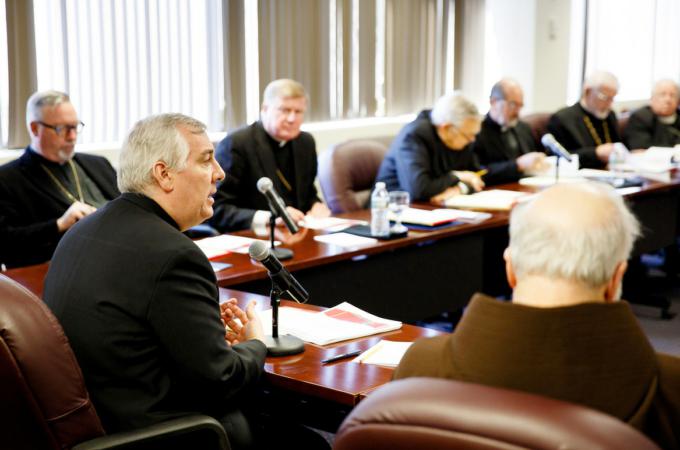Seminars aim to clarify new annulment process
BRAINTREE -- To help clergy, pastoral staff, and laypeople understand the changes Pope Francis' 2015 motu proprio, "Miti Iudex Dominus Iesus," made to the annulment process the Metropolitan Tribunal of the Archdiocese of Boston, headed by Judicial Vicar Father Mark O'Connell, has been holding seminars explaining the process across the archdiocese.
There have been a total of around 20 seminars, with the first round of about 10 geared specifically to clergy and pastoral staff, and the second, still ongoing round meant for laypeople who are considering an annulment or know others who are.
Father O'Connell, speaking with The Pilot May 19, said that many people who attended the seminars were unaware of some of the changes "Mitis Iudex" has brought to the annulment process in the archdiocese.
One of the biggest changes the papal document introduced, Father O'Connell said, is the addition of the "briefer process." As the name suggests, it allows for a quicker annulment process, but only for the "most obvious cases," he said.
Article 14 in "Mitis Iudex" notes that those cases might include: "the defect of faith which can generate simulation of consent or error that determines the will"; "a brief conjugal cohabitation"; "an abortion procured to avoid procreation"; "the deceitful concealment of sterility, or grave contagious illness, or children from a previous relationship, or incarcerations"; and "physical violence inflicted to extort consent."
Father O'Connell said the Tribunal is already on its 27th briefer process case.
"The briefer process is working... There are people who just couldn't do this before who are coming to us," he said.
He noted that another reason more people are approaching the tribunal is because it is now easier to file for an annulment.
Before the document came into effect, a person seeking an annulment (called the "petitioner") could either bring their case to the tribunal in the diocese where the wedding took place, or the diocese where the other party (called the "respondent") lives. If the petitioner had moved away, they could only bring the case in the diocese where they currently live with the consent of the respondent.
In situations of foreign marriages, the Boston tribunal couldn't hear the case at all, because both parties were required to live in the territory of the same conference of bishops.
"There are only certain places you can file, but they're opened up. And they're especially opened up for immigrants," said Father O'Connell.
"In the past, when only the person filing lived here but the marriage and the other party was outside the country, I could not do the case. Now I can do the case," said Father O'Connell.
He said that another change that has come out of "Mitis Iudex" has been the elimination of annulment fees in the archdiocese.
In the past, it cost people $750 to go through the annulment process, even though the archdiocese would often waive the fees for families who might not have been able to afford it. Now, however, the archdiocese no longer requires fees at all.
Instead, Father O'Connell said, those going through the annulment process will be asked if they wish to give a donation to the Catholic Appeal, which now completely covers the cost of the annulments. He noted that "Mitis Iudex" does not require that dioceses give up annulment fees; it only suggested that they do, and he estimated that about 50 percent of dioceses around the country likely still require fees.
"Because of the briefer process, and because of the new rules in tribunal, and because of the elimination of fees, there are a lot more cases in the tribunal," Father O'Connell said.
While the seminars for clergy and pastoral staff are finished, the last remaining seminar for laypeople will be on June 12, at St. Michael Parish in Lowell at 3:00 p.m.



















